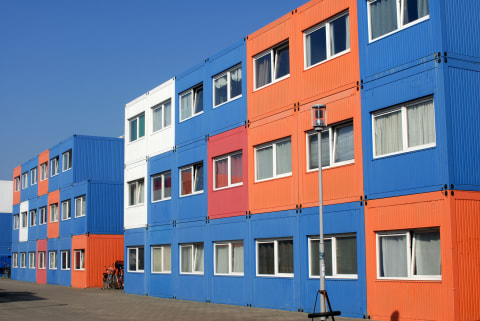Advertisement
Shipping Container Homes Are A Thing (And You're Going To Want One)

The tiny home trend continues to gain traction with those of us looking to cut down on excess and take on a simpler life. Like conventional homes, tiny pads now come in all shapes and sizes—from sleek, high-tech spaces to woodsy, quaint cabins. And the latest iteration of extreme living is even more out of the box.
Designers are now using shipping containers to build creative, fantastical structures. Take James Whitaker—a London-based architect who is shaping them into a crystalline-inspired home in Joshua Tree.

"It's like the science experiment where you take a bit of salt and dangle it on a cotton thread into a jar of saline solution," Whitaker says of his inspiration for the space. "You leave it there for a little while, and your solution gravitates to the salt, and you end up with this crystal formation dangling on the end of the thread." Once it's complete, the 2,000-square-foot home will run on solar power and feature a private hot tub carved into the rocky terrain.
Whitaker originally conceived of the design as a European office building, but that project never came to fruition. The Joshua Tree home was born when a film producer from LA found mock-ups for the space online and knew he wanted to call it home. The fact that the shipping container design appeals to luxe homeowners as well as practical businesspeople is proof of its versatility.
The pros and cons.
Shipping containers are, unsurprisingly, difficult materials to work with. They have a set size—about 8 feet wide, 8 feet high, and either 20 or 40 feet long—and their weight makes them trickier to transport than raw material.
"They present a whole manner of obstacles: They're roughly the same width as a double bed—so how do you fit a double bed into them? It's little, practical things like this that make them difficult to work with." At the same time, Whitaker says, challenging materials tend to lead themselves to more interesting designs. "Those obstacles generate ideas that might not have otherwise come to fruition."
Evidence of this creativity is everywhere. These days, you can find simple, single-container spaces or grand apartment buildings like La Aduana in Mexico, made out of 36 containers, and the Adriance house in Northern Maine, made of 12. Shipping containers stack up to boutique hotels, high-rises, schools, and disaster-relief housing.

The material's price point (you can find them for less than $1,000 apiece) and inherent sustainability are driving its more mainstream appeal. By using a container that would have otherwise gone to landfill, you're giving it a second life instead of relying on new raw materials. With upcycled clothing and home goods gaining traction, why shouldn't upcycled homes be next?
Looking for some more out-of-the-box homes? Check out these extreme Airbnbs.